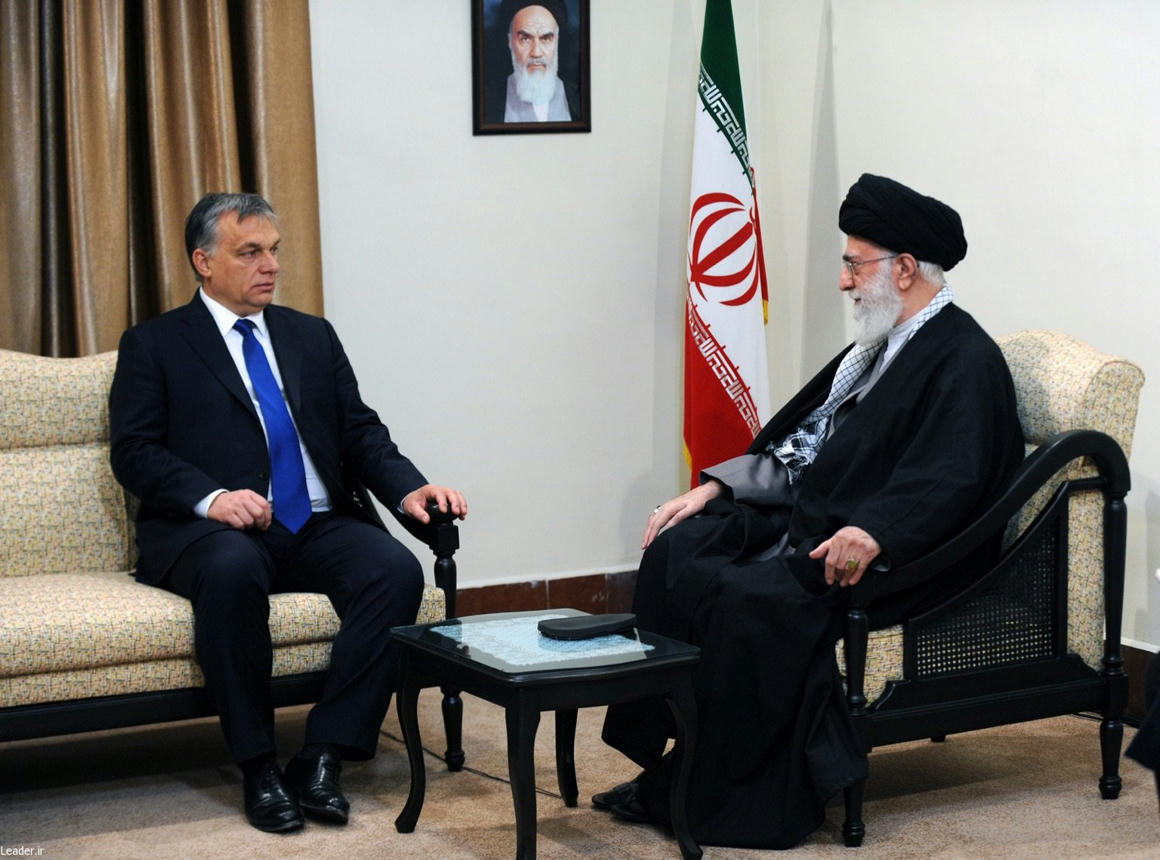How once cherished Iranians became coronavirus scapegoats in Orban’s Hungary

“They would not only ruin her career, but now they want to deport her back to a country where they are already digging mass graves for the victims of the virus,” said the legal representative of an Iranian medical student. The student has lived in Hungary since the early 2010s and together with fourteen other Iranian students, was expelled from Hungary in mid-March for allegedly violating quarantine rules.
The Iranian girl, represented by lawyer Zsolt Szekeres and attorneys at the Hungarian Helsinki Committee, a civil rights organization, as well as several other Iranian students were sent to Szent Laszlo Hospital in Budapest in early March on suspicion of having coronavirus. She claims that she fully cooperated with the hospital staff and adhered to all the rules, but was expelled by the National Directorate-General for Aliens Policing (OIF) from Hungary and the European Union. She feels that this was only because of how other Iranian students had behaved, and because she is Iranian too.
Iranian students have sought immediate legal protection to avoid deportation pending a court ruling. However, their request was rejected on Tuesday.
On March 4, it was announced that the first two registered coronavirus patients in Hungary were two Iranian university students. Government agencies have disclosed relatively large amounts of personal information about them and about their acquaintances who also had to be quarantiened due to having had contact with them. Meanwhile, Gyorgy Bakondi, a security adviser to Viktor Orban, and the Prime Minister himself have repeatedly linked the spread of coronavirus to Iran.
“There is a clear link between illegal migration and the coronavirus epidemic, with many immigrants coming from or through Iran, which is one of the focal points of the infection,”
Orban said in a meeting with EU leaders on March 10.
The tough action against Iranian students is in stark contrast to the government’s handling of Iran in recent years. The Orban government has done a lot to develop a friendship with Tehran, and in this process, higher education has been of paramount importance. Under the Orban government, the number of Iranians studying in Hungary and staying there for a long time has increased significantly. Moreover, in recent years, many Iranians came to live in Hungary for purposes other than studying too. The governments of the two countries have agreed on numerous ways of economic cooperation.
The change in attitude towards Iran was explained to Direkt36 by Hungarian foreign ministry and diplomatic sources. According to them, one reason is that the Orban government’s hopes for opening up to Iran have not been fully realized. Also, the Hungarian-Iranian rapprochement provoked serious resistance from Israel and then from the United States when Donald Trump took office.
Iranians bring in tens of thousands of dollars per person
It was just a little more than a month after the European Union had officially accepted the Iran nuclear deal when Viktor Orban traveled to Tehran in late November 2015. “For us Hungarians, it is a special experience to be here in Tehran. We are at the center of a great civilization,” the Hungarian Prime Minister said. According to state news agency MTI’s reportont he trip, Orban “also noted that 1,116 Iranian students are currently studying in Hungary and they will be decisive players in future Iranian-Hungarian relations. He recommended to his Iranian counterpart to deepen this cooperation.” The Orban government’s opening up to Iran was at odds with its own talking points, which were largely based on anti-migrant and anti-Muslims messages at that time already.
By 2015, a policy shift in the Hungarian Foreign Ministry, renamed as Ministry of Foreign Affairs and Trade (KKM), was already completed. Establishing economic ties and gaining foreign markets became main tasks of Hungarian diplomacy. Several officials working for the ministry at the time told Direkt36 that they saw an opportunity in recently sanction-free Iran. For example, on his 2015 trip to Tehran, Viktor Orban was accompanied by a large delegation of 140 businessmen. Although the focus was on projects and investments with economic benefits, educational, cultural and scientific co-operation also played an important role in boosting Hungarian-Iranian relations.

Hungarian Prime Minister Viktor Orban’s meeting with Ayatollah Ali Khamenei, Supreme Leader of Iran in Tehran in November 2015. Photo: leader.ir
The deepening of the cooperation was so successful that the number of Iranian students actively studying in Hungary doubled by 2018 compared to the 2015 level referred to by Orban, according to figures by the Hungarian Central Statistical Office (2015: 1116; 2018: 2169. 2019 data is not yet available). According to a 2018 analysis available on the website of the Tempus Public Foundation, “it has been a remarkable process for the last 6-7 years, then there was a dramatic increase in the last three years in the number of Iranian students studying in Hungary. It is also decisive that the majority of Iranian students, 72% in 2016, were enrolled in medical, dental and pharmaceutical studies”
“I chose Hungary because it’s a nice country with nice cities and universities with good ranking in the EU and English-language education. The most important thing is learning in English at university and also that we were able to go to work in other European countries after completing our studies here. Tuition fees are lower than in universities offering courses in English in other countries, such as the United Kingdom,”
an Iranian student expelled from the country in March 2020 told Direkt36. Hungarian universities were also benefiting from students coming from Iran and other countries, mainly from the Middle East and Asia. Tuition payments from foreign students helped universities make up for losses in Hungarian state subsidies due to decreased number of Hungarian students. (Abcug.hu previously published a detailed article on Iranian and other foreign students in Hungarian universities coming from Eastern countries.)
And that is a lot of money: we know from an acquaintance of one of the expelled Iranian students that Iranians studying at Semmelweis University paid $6,000 for pharmacy studies and $9,100 for medical studies per semester (this is also the official tuition published on the university’s website). ”To the best of my knowledge, we all paid for the university out of our own pockets in the range of $13,000-20,000 peryear,” said another Iranian student. They feel that now all their money and their years spent in Hungary have been for nothing.
However, the Hungarian state not only tried to attract paying students to Hungarian universities, but also gave them state-funded scholarships called Stipendium Hungaricum (SH). SH is overseen by the Ministry of Foreign Affairs and Trade and is usually granted to students from Asian and Middle Eastern countries, with most applicants coming from Pakistan, Syria and Jordan. The number of Iranian scholarship holders also began to rise after the February 2017 meeting of the Hungarian-Iranian Joint Economic Cooperation Committee. The joint committee decided that the Hungarian government would grant scholarships to an additional one hundred Iranian students.
“Hungary welcomes the high number of Iranian students at Hungarian higher education institutions and hopes that more Iranian young people will be able to continue their studies in Hungary through the government scholarships that we are offering,” reads the joint committee’s official meeting report which was obtained by Direkt36 through public information request.
Just a few months after the decision, by the autumn of 2017, the number of Iranian student’s receiving Hungarian state scholarships increased from 1 to 49. Neither the Hungarian Ministry of Foreign Affairs and Trade, the Embassy of the Islamic Republic of Iran in Budapest, or Semmelweis University answered our question whether any of the expelled students were recipients of the Stipendium Hungaricum scholarship.
Not only students were welcomed by the Hungarian state
Iranian students typically have a residence permit for study purposes in Hungary, but the government not only opened the gates for them. During the years of the Orban government’s opening up to Iran, a group of thousands of Iranians came toHungary whose purpose for staying was unknown.
We are aware of this group because Direkt36 previously requested public information on those who obtained a residence permit for “other purposes” in Hungary. According to a lawyer interviewed by us who works with foreign clients, it is usually difficult by default to obtain this type of residence permit, as the National Directorate-General for Aliens Policing (OIF) requires detailed justifications. This ”other” category includes, for example, those arriving for the purpose of language studies, buying and renting out real estate, receiving medical treatment, or studying at an educational institution not accredited in Hungary.
Between 2010 and 2018, during the Orban government’s years, Iran became the country from which the most people (4,778) have received residence permits for „other purposes”, according to OIF. Every year since 2016, Iran has topped this list, ahead of the Americans, the Russians and the Chinese (the United States ranks second with 4,531 permits). The issuance of this type of permit skyrocketed after the Hungarian residency bond (golden visa) program ceased, and it is not known what exactly these permit holders are doing in Hungary.
The Orban government did not try to lure Iranians into the country for extended periods, they gave them permanent residency. Direkt36 requested the Ministry of Foreign Affairs and Trade to provide documentation on Hungarian-Iranian economic cooperation. According to the meeting report of the 2017 Hungarian-Iranian Joint Economic Cooperation Committee meeting, the Orban government and the Government of the Islamic Republic of Iran have identified eleven different areas where they wanted to deepen cooperation, one of which was education and youth issues. Cooperation in science, technology and health has also been identified as a specific group of fields, which are also linked to higher education in medicine and pharmacy.
They also adopted a joint action program to boost tourism. In addition to the organization of delegations and interinstitutional cooperation, the action plan also covers cooperation between educational institutions and student exchange programs, particularly in the field of tourism and hospitality.
Great economic plans, however, were overwritten by changes in world politics.
Trump came and the friendship with Iran came to a halt
Israel, which sees Iran as an existential threat, did not like the Hungarian-Iranian rapprochement. Although the two countries’ relationship – based on the personal friendship of Viktor Orban and Benjamin Netanyahu – has become extremely close in recent years, the question of Iran remained a source of disagreement, both Hungarian and Israeli sources knowledgeable on bilateral issues told Direkt36.
However, the Hungarian-Iranian friendship stalled not because of Israel’s opposition, but because of Donald Trump’s administration and his hardliner anti-Iranian policies. After Trump withdrew from the Iran nuclear deal in 2018 and reintroduced sanctions against Iran, earlier plans for Hungarian-Iranian economic cooperation – joint nuclear reactor construction, bus production, agricultural projects – disintegrated.
Hungarian-Iranian nuclear cooperation received the most attention. On April 8, 2017, Deputy Prime Minister Zsolt Semjen and Ali Akbar Salehi, Iran’s Vice President and Head of the Iranian Atomic Energy Organization, signed a letter of intent. We received the document from the Hungarian Ministry for Innovation and Technology (ITM) following a public information request. The agreement dealt mainly with peaceful, civilian nuclear education and cooperation in nuclear research and development, but did not contain any specific details.
A Hungarian official working on foreign policy told Direkt36 that the deal was an Iranian initiative. Although there were plans for joint development of miniature nuclear power plants and their sale in third world countries, this soon died down. “This agreement was basically for Iranian propaganda purposes, and it is no accident that the Iranians were in a hurry to communicate the whole thing, not the Hungarian side,” the source added.
U.S. actions have deterred smaller countries from doing business with Iran starting in 2018.Washington also directly put serious pressure on its allies to cut back on all forms of economic and diplomatic cooperation.
Several Hungarian foreign ministry officials told Direkt36 that, while they tried to fend off similar American requests against Russia or China – countries with a much heavier economic weight –, the ministry concluded that it was worth sacrificing the Iranian relationship and thus scoring points with the Trump administration.
“We had business attempts in Iran, but they failed and our expectations failed. Americans, on the other hand, are our largest non-EU investors in Hungary, so for us, the United States has always been more important than anyone else.”
This is how a government official dealing with foreign trade explained the situation to Direkt36. For example, in 2018, Hungarian state oil company Mol had to stop buying oil from Iran, after just a year earlier, the Hungarian minister of foreign affairs proudly announced the deal standing next to his Iranian counterpart.
Due to a change of course in world politics, the second meeting of the Hungarian-Iranian Joint Economic Cooperation Committee has not yet taken place. However, the government did not give up on educational cooperation despite the other joint plans being halted. In March 2018, the Minister of Health and Medical Education of Iran visited Hungary, organized by the Hungarian Ministry of Human Capacities, where a cooperation agreement between Semmelweis University and the Tehran University of Medical Sciences was also signed.
Migrants bring the coronavirus
After all these turns we come to March 1, 2020. At a press conference of the so-called Operational Group, responsible for the containment of the coronavirus, Gyorgy Bakondi, the homeland security adviser to the Prime Minister, said that “there is a certain connection we see between the coronavirus and illegal migration.” Bakondi announced that since Iran is one of the focal points of the coronavirus infection, and because Afghan, Pakistani and Iranian migrants arriving at the Hungarian border are coming from or through Iran, they will close down transit zones (tasked with receiving asylum seekers at the border) for an indefinite period.
A few days later, on March 4, the first confirmed cases of coronavirus in Hungary were reported, both of whom were Iranian students. This was followed by exploring their contacts and then quarantining Iranian students. Several of the quarantined Iranian students have complained in the media that no one communicates with them in English, they do not know what is happening to them, and are frightened that they have been enclosed together and exposed to a person with coronavirus. The Operational Group, on the other hand, accused them of aggression, disorderly conduct, and violation of quarantine rules.Then the National Directorate-General for Aliens Policing expelled from the country two Iranians on March 13 and thirteen more on March 16. According to the Hungarian Helsinki Committee, which helps one of the Iranian student with legal representation, “the authorities have not clarified who played a personal role in the possible violation of the rules. There are indications that this is a collective punishment that violates the presumption of innocence and the right to a fair trial.”
The story of the Iranian students was extensively covered in pro-government and public media for days. Since early March, the Operational Group’s official coronavirus website has published several articles on the Iranians. They revealed a great deal of personal information about them while virtually no information about other patients has been disclosed, citing the need to protect their privacy. From the first case onwards, the Operational Group begins their updates starting always with the Iranian students (ten cases in total since then).
Infectuous diseases specialists told Direkt36 that there was no proven link between Iranian students and the infections in the Hungarian population. Iranian students have only infected their own community, and it has been proven that the coronavirus was not passed on to other students at the two universities involved, Semmelweis University and Szent Istvan University. Iranian students studying in Hungary themselves became infected because several of them visited Iran, where the epidemic has caused serious damage due to delayed response by local authorities, one doctor told Direkt36. He also added that
“It is just bad luck that the Iranians were the first to be infected in Hungary.”
Zsolt Szekeres, lawyer with the Hungarian Helsinki Committee, told Direkt36 that after his client and other Iranians were released from quarantine, they were called by the police and each received summons to the National Directorate-General for Aliens Policing (OIF) for allegedly violating epidemic rules. Then, according to Szekeres, in anunusually fast manner, OIF carried out 13 legal proceedings in just one day, which were closed by two decisions. One of them revoked the students’ residence permit for study purposes, the other one expelled them not only from Hungary, but also from the European Union for three years. Szekeres said that their client was the victim of collective punishment and the Iranian girl had never had any problems with the Hungarian authorities before. The OIF made its decision solely on the basis of police records, although the police did not investigate in detail, who exactly did what in the quarantine.
Approximately four days into the eight-day appeal period, OIF officers informed students that they had booked plane tickets for them to Tehran through Qatar for the following morning. However, students instead applied for a review later that evening with a suspensive effect on the deportation. The lawyer is not aware that the Iranian Embassy was involved in the process in any way, nor did the Embassy respond to a request by Direkt36.
Fidesz MEP Tamas Deutsch said in an interview on the link between the virus, migration and Iran, that they merely “objectively identify obvious links instead of trying to comply with what political correctness dictates”, and “when we hear that Iran is one of the world’s, while Italy is Europe’s biggest focal points of the coronavirus, it is absolutely natural, for example, that people will have reservations about tourists from these nations.”
András Szabó and Blanka Zöldi contributed to this article.

